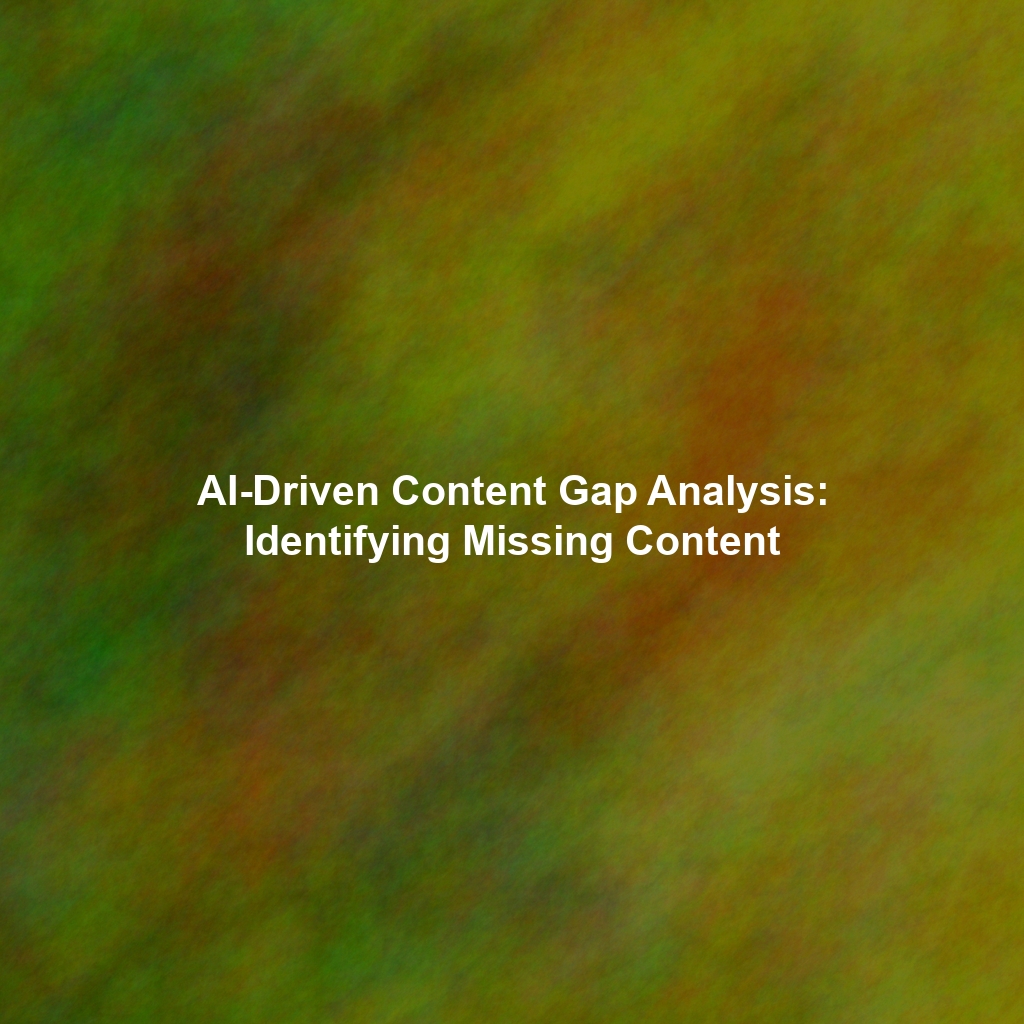Listen, in the relentlessly fast-paced and ever-shifting world of Search Engine Optimization (SEO), just cramming keywords into your content is a dinosaur move – a relic of a bygone era. Modern SEO is no longer about superficial keyword matching; it’s fundamentally about truly understanding what users *want* when they search, and how words, concepts, and ideas intrinsically connect to form comprehensive meaning. This is precisely where semantic analysis tools enter the strategic spotlight. These powerful, intelligent tools empower savvy SEO professionals to create content that not only clicks with complex search engine algorithms but, more importantly, genuinely resonates with actual human readers, leading directly to superior organic rankings, increased qualified traffic, and a stronger, more authoritative online presence.
This article will guide you through the transformative capabilities of semantic analysis tools, explaining their core functionalities, highlighting leading platforms, and demonstrating how they can become your indispensable secret weapon in the competitive SEO landscape. It’s about moving from simply being found to being truly understood and valued by your audience.
STRATEGIC IMPERATIVE:
Modern SEO demands understanding meaning, not just keywords. Semantic analysis tools bridge the gap between search queries and truly comprehensive, user-centric content.
What’s Semantic Analysis and Why Should SEOs Care? The Shift to Meaning
At its core, semantic analysis isn’t just about matching individual keywords on the surface. It’s a sophisticated branch of Natural Language Processing (NLP) that focuses on extracting the deeper meaning, context, and relationships between words, phrases, and concepts within a piece of text. Instead of merely looking for exact keyword matches, semantic analysis evaluates how words relate to each other, how they contribute to the overall main topic, and, critically, what the user probably *meant* or intended when they typed in a search query. This shift from keyword density to contextual relevance is fundamental to modern search algorithms, particularly Google’s emphasis on understanding user intent and providing the most comprehensive answer.
Here’s precisely why understanding and leveraging semantic analysis is a game-changer for SEO professionals:
- Better Grasp of User Intent: By analyzing search queries, related searches, and the content that currently ranks, these tools help you accurately figure out what users are *actually* trying to find, rather than just the literal words they typed. This allows you to create content that directly addresses their underlying need.
- More Relevant and Comprehensive Content: Semantic analysis guides you in creating content that thoroughly covers a topic, including all its related subtopics, entities, and concepts. This makes your content far more useful, authoritative, and satisfying for users, signaling to search engines that it’s a comprehensive resource.
- Smarter Keyword Research & Expansion: Go beyond simplistic keyword lists. Semantic tools help you discover semantically related keywords, latent semantic indexing (LSI) keywords, and long-tail phrases that can broaden your organic reach and capture traffic from diverse, yet relevant, search queries that you might otherwise miss.
- Well-Organized and User-Friendly Content: Understanding semantic relationships helps you structure your content logically, ensuring a natural flow of ideas. This makes it easier for human readers to consume and enhances its meaning and relevance for search engine crawlers, improving both user experience and SEO.
- Higher Rankings & Increased Organic Traffic: By consistently providing users with exactly what they want – comprehensive, relevant, and well-structured content that truly answers their queries – you significantly boost your chances of ranking higher in search results, leading to increased organic visibility and qualified traffic.
- Future-Proofing Your SEO: As search engine algorithms continue to evolve and become more sophisticated in understanding natural language, a semantic approach ensures your SEO strategy remains resilient and effective against future updates.
Key Features You’ll Find in Semantic Analysis Tools: Your Analytical Toolkit
While the specific functionalities of semantic analysis tools can vary between platforms, many share a common set of powerful features designed to help SEOs understand and optimize content for meaning and context. These features form your analytical toolkit for deeper content insights:
- Entity Recognition & Extraction: This feature identifies and categorizes named entities (e.g., people, companies, places, products, concepts) within a piece of text. For SEO, this helps ensure your content covers all relevant entities related to your main topic, signaling comprehensiveness to search engines.
- Sentiment Analysis: This capability determines the emotional tone or “vibe” (positive, negative, neutral) of a piece of text. For SEO, understanding sentiment around your brand or topic can inform content strategy, particularly for reputation management or identifying customer pain points.
- Keyword Extraction & Topic Modeling: Beyond simple keyword density, these features automatically identify the most important keywords, phrases, and overarching subjects or themes discussed in a document or a cluster of texts. This helps you ensure your content is truly on-topic and covers all necessary sub-topics.
- Semantic Similarity Analysis: This measures how related different pieces of text are in terms of their underlying meaning, even if they don’t share many exact keywords. This is invaluable for identifying content gaps, finding related topics, or ensuring consistency across your content clusters.
- User Intent Analysis: This sophisticated feature attempts to determine the user’s ultimate goal or purpose behind a search query (e.g., informational, navigational, transactional, commercial investigation). Aligning your content with user intent is paramount for ranking and satisfying users.
- Content Gap Analysis (Semantic): Identifies topics or subtopics that your competitors are covering semantically for a given keyword, but which are missing or underdeveloped in your own content, revealing opportunities for comprehensive coverage.
- Content Score/Optimization Suggestions: Many tools provide a “content score” based on semantic completeness and relevance, offering real-time suggestions for keywords, topics, and entities to include to improve your content’s ranking potential.
A Look at Some Top Semantic Analysis Tools for SEOs: Your Arsenal of Insight
The market for semantic analysis tools is growing, with several powerful platforms offering unique strengths. Here’s a quick rundown of some of the leading semantic analysis tools available to SEOs, along with their core functionalities, pricing models, and ideal use cases:
Surfer SEO: The Content Optimization Specialist
Surfer SEO is renowned for its focus on on-page content optimization driven by semantic analysis. It helps users create and optimize content to outrank competitors by analyzing top-performing pages for a given keyword.
- Key Features: Features a robust Content Editor that provides real-time suggestions for semantically related keywords, optimal word count, heading structures, and image count based on top-ranking content. Its SERP Analyzer allows you to dissect the on-page elements of competing pages. Includes keyword research tools and content planning features.
- Pricing: Starts at approximately $69 per month for basic plans, scaling up for more features and content credits.
- Best For: Content creators, SEO specialists, and agencies focused on creating highly SEO-friendly content from scratch, boosting the rankings of existing content, and gaining granular insights into competitor on-page strategies.
Semrush: The Comprehensive SEO Suite with Semantic Capabilities
Semrush is a widely recognized, all-in-one SEO and content marketing platform that integrates semantic analysis into various aspects of its toolkit, particularly within its content creation features.
- Key Features: Offers extensive keyword research, comprehensive competitor analysis, site auditing, and position tracking. Its Content Marketing Platform includes an SEO Writing Assistant that helps analyze content for semantic optimization, readability, tone of voice, and originality. The Topic Research tool helps uncover semantically related content ideas.
- Pricing: Starts at approximately $129.95 per month for Pro plans, with higher tiers for advanced features and larger data limits.
- Best For: Businesses and agencies seeking a comprehensive SEO solution that covers everything from keyword research and technical SEO to content creation and competitive analysis, with integrated semantic insights.
MarketMuse: The AI-Powered Content Intelligence Platform
MarketMuse is an AI-powered content intelligence platform that focuses on helping businesses build topical authority and identify content gaps through deep semantic analysis of their existing content and competitive landscape.
- Key Features: Provides in-depth content inventory analysis to identify content gaps and opportunities. Its Topic Research capabilities help discover comprehensive topic clusters and semantically related concepts. Offers content optimization suggestions and generates detailed content briefs for writers, ensuring comprehensive coverage of a topic.
- Pricing: Depends on usage and desired features; custom pricing is available, making it typically suited for larger enterprises or content-heavy organizations.
- Best For: Large content teams, enterprises, and publishers focused on building extensive topic clusters, achieving deep topical authority, identifying significant content gaps, and creating detailed, semantically optimized instructions for their writers.
Clearscope: The Content Optimization and Grading Tool
Clearscope is a highly regarded content optimization tool that leverages semantic analysis to provide actionable insights for improving content relevance and comprehensiveness for specific keywords.
- Key Features: Generates detailed content optimization reports for target keywords, offering real-time feedback on content quality, comprehensiveness, and semantic relevance. It integrates seamlessly with Google Docs and WordPress, making it easy for writers to implement suggestions directly within their workflow.
- Pricing: Starts at approximately $170 per month, positioning it as a premium tool for serious content marketers.
- Best For: Content teams and SEOs focused on meticulously improving the SEO performance of existing content, ensuring new content is highly optimized for specific keywords, and maintaining high content quality standards.
WordLift: The Semantic SEO and Knowledge Graph Builder
WordLift takes a unique approach by focusing on structuring your website’s content with semantic data (schema markup) to make it more understandable for search engines and to build a knowledge graph around your content.
- Key Features: Uses AI and NLP to automatically add structured data (schema markup) to your website, making it easier for search engines to understand the entities and relationships within your content. This helps in achieving rich snippets and enhancing overall semantic SEO. It also helps in creating internal knowledge graphs to connect related content on your site.
- Pricing: Starts around 79€ per month, with plans varying based on website size and features.
- Best For: Businesses looking to implement advanced structured data strategies, enhance their website’s understanding by search engines, build robust internal knowledge graphs, and improve their chances of appearing in rich search results.
Picking the Right Semantic Analysis Tool for You: A Strategic Decision
The optimal semantic analysis tool for your business will depend heavily on your specific needs, existing tech stack, and budgetary constraints. It’s a strategic decision that should be made after careful consideration of several key factors:
- Your Budget: Semantic analysis tools represent a range of investment levels, from free (with limited features) to hundreds of dollars per month for comprehensive, enterprise-grade solutions. Clearly define your budget before evaluating options.
- Your Specific Needs & Use Cases: What are the primary tasks you need the tool to accomplish? Are you primarily focused on in-depth keyword research, optimizing existing content, identifying competitor content gaps, building topic clusters, or implementing structured data? Match the tool’s core strengths to your most pressing needs.
- Your Team’s Technical Skills & Learning Curve: Some tools offer highly intuitive user interfaces and automated suggestions, making them accessible to less technical marketers. Others provide more granular control and require a deeper understanding of SEO principles. Consider your team’s existing skill set and willingness to learn.
- Integrations with Your Existing Stack: Does the tool seamlessly integrate with other platforms you’re already using, such as your Content Management System (CMS), Google Docs, Google Analytics, or your CRM? Smooth integrations can significantly enhance workflow efficiency.
- Scalability: Will the tool be able to handle your needs as your content production or website size grows? Consider data limits, user seats, and the ability to manage multiple projects.
- Support & Community: Does the tool offer robust customer support, tutorials, and an active user community? This can be invaluable for troubleshooting and learning best practices.
The Future of SEO? It’s Undeniably Semantic
As search engine algorithms continue their relentless evolution, becoming increasingly sophisticated in understanding natural language, context, and user intent, semantic analysis will only become more paramount for SEO success. The days of simply optimizing for exact-match keywords are long gone. By strategically embracing and utilizing these powerful tools, you can create content that truly understands and comprehensively answers what users are looking for, moving beyond superficial keyword matching to deep, meaningful relevance. This leads directly to better rankings, increased organic traffic, superior user experience, and a stronger, more authoritative online presence.
Investing in the right semantic analysis tools today is not just a tactical improvement; it is a strategic investment in the future resilience and effectiveness of your entire SEO strategy. It positions your brand to thrive in a search landscape that prioritizes understanding and delivering comprehensive value to the user.
 Skip to content
Skip to content

